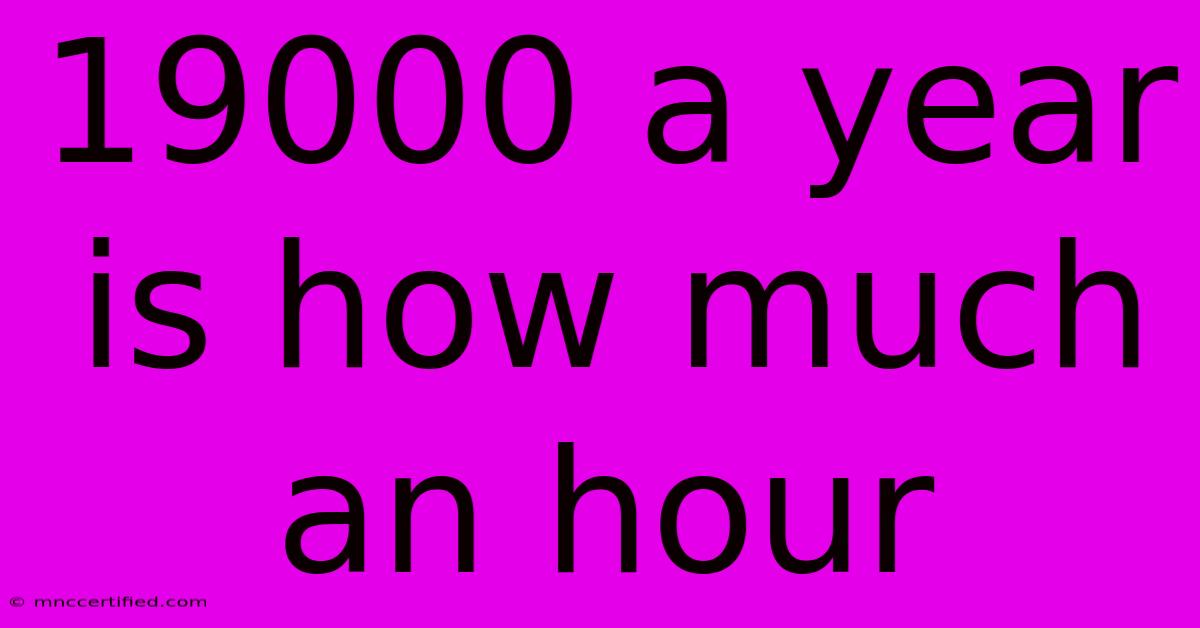19000 A Year Is How Much An Hour

Table of Contents
19000 a Year is How Much an Hour? A Complete Guide to Salary Calculations
Figuring out your hourly rate from an annual salary can seem confusing, but it's a simple calculation with significant implications for understanding your earning power. Knowing your hourly wage helps you compare job offers, negotiate your salary, and even budget more effectively. This comprehensive guide will walk you through calculating how much $19,000 a year translates to an hourly rate, considering various factors.
Understanding the Basics: Annual Salary to Hourly Wage
The core calculation is straightforward: divide your annual salary by the number of working hours in a year. However, this requires understanding a few key variables:
- Number of working weeks: A standard work year is considered 52 weeks.
- Hours per week: A full-time position typically involves 40 hours per week.
- Consider Paid Time Off (PTO): Many jobs include paid vacation, sick leave, and holidays. These hours aren't technically worked, impacting your effective hourly rate.
Calculating Your Hourly Rate: $19,000 per Year
Let's break down the calculation for a $19,000 annual salary, assuming a standard 40-hour work week and no PTO:
- Total hours per year: 52 weeks/year * 40 hours/week = 2080 hours/year
- Hourly rate: $19,000/year / 2080 hours/year = $9.13 per hour (approximately)
Therefore, a $19,000 annual salary translates to roughly $9.13 per hour based on a standard full-time work schedule.
The Impact of Paid Time Off (PTO)
The above calculation ignores PTO. If your job includes 2 weeks of paid vacation (80 hours), the calculation changes:
- Total working hours per year: 2080 hours - 80 hours = 2000 hours
- Hourly rate with PTO: $19,000 / 2000 hours = $9.50 per hour (approximately)
As you can see, including PTO slightly increases your effective hourly rate. The more PTO you receive, the higher this adjustment will be.
Factors Affecting Your Actual Hourly Earnings
While the basic calculation provides a good starting point, several additional factors can influence your actual hourly earnings:
- Overtime: If you work overtime, you'll earn a higher hourly rate, usually 1.5 times your regular rate.
- Bonuses: Annual bonuses and commissions aren't factored into the base hourly rate but significantly affect your overall compensation.
- Taxes and deductions: Your net hourly pay (take-home pay) will be lower than your gross hourly pay due to taxes, social security, and other deductions. Use a payroll calculator to estimate your net pay.
- Benefits: Employer-provided benefits like health insurance and retirement plans also influence your total compensation, though they aren't directly reflected in your hourly rate.
Using Online Salary Calculators
Many online calculators can help you determine your hourly rate quickly and accurately. These tools often allow you to input your annual salary, working hours, and PTO to get a more precise estimate.
Why Knowing Your Hourly Rate Matters
Understanding your hourly rate is crucial for:
- Job comparisons: Easily compare job offers with different salary structures.
- Salary negotiation: Knowing your hourly rate empowers you to negotiate a fair wage.
- Budgeting: Accurately calculating your income helps with personal finance planning.
- Freelancing and contract work: If you're considering freelancing, knowing your hourly rate is essential for setting your fees.
By understanding the factors involved and using the resources available, you can confidently calculate your hourly rate from an annual salary and make informed decisions about your financial future. Remember to always consider all aspects of your compensation package when evaluating job offers.

Thank you for visiting our website wich cover about 19000 A Year Is How Much An Hour. We hope the information provided has been useful to you. Feel free to contact us if you have any questions or need further assistance. See you next time and dont miss to bookmark.
Featured Posts
-
November 21 24 Racing On Tv
Nov 21, 2024
-
Moroney Accepts Award Sentimentally
Nov 21, 2024
-
A View From My Seat Crypto Arena
Nov 21, 2024
-
Chesapeake Life Insurance Dental
Nov 21, 2024
-
Support Ukraine Stalker 2 Voices
Nov 21, 2024